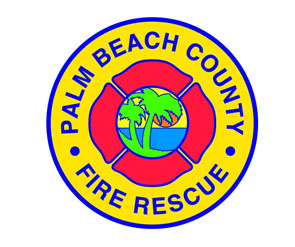Palm Beach County Fire-Rescue District Chief William Rowley presented his annual report on fire-rescue services in the community at the Wellington Village Council meeting on Tuesday, March 26.
Rowley’s report detailed the services provided throughout Wellington from Oct. 1, 2016 through Sept. 30, 2017.
Rowley broke down the nearly 5,300 emergency calls in Wellington that were made last year. The majority of the calls made were medical calls (3,914 calls), which, Rowley explained, is consistent throughout the county.
Although the high percentage of medical calls is normal, Mayor Anne Gerwig expressed interest in finding out how many medical emergency calls were made as a result of overdoses in Wellington.
“It’s an important problem nationwide, and we want to keep an eye on it,” Gerwig said.
The 411 vehicle accident related calls last year were also of concern for Rowley, as there is not much that can be done about the increasing traffic throughout the village and the resulting vehicle incidents.
“We are going to see the number [of vehicle accident calls] increase. Traffic, especially at evening times, is pretty heavy. That number will go up as the population grows, so there is really no getting around that number,” Rowley explained.
Rowley said that a portion of the total 132 emergency fire-related calls made last year were car fires. Other emergency calls made were about water-related injuries (3 calls), hazardous materials/power lines (47 calls), assists/investigations (277 calls), alarms (594 calls) and inter-facility transports (12 calls).
The overall number of emergency calls made in the past year to PBCFR from Wellington increased by about 400 calls. Rowley said that although the call volume has increased since, the average response time of about six and half minutes has only increased by about five seconds. Rowley explained that stations and units in neighboring municipalities are able to work together in order to tend to people’s emergencies quickly and efficiently.
Rowley also explained that special fire-rescue personnel teams have adapted and are trained to deal with some of the emergency needs unique to Wellington. Rowley mentioned past lengthy phone calls made after incidents dealing with pipelines during construction in the village, to which special personnel were able to efficiently respond. Rowley added that some of the village’s fire-rescue units trained to do high angle and rope rescues have learned to respond to emergencies with larger animals.
“We have trained special operations teams that come out to take horses out of pools and ponds,” Rowley said.
Rowley explained that within the last year, PBCFR employees underwent 100 hours of additional training, as they do every year. Employees are educated and trained on topics including advanced pediatric life support, advanced cardiac life support, trauma life support, smoke drills, high-rise firefighting and more.
Gerwig thanked Rowley for the service his agency provides.
“We have a confidence in [being able to] call 911 and know that someone is trained the way that you guys train [responders],” Gerwig said.
The CARES team — previously known as the CAT team — is the Comfort, Assistance, Resources, Evaluation and Safety Net, Rowley explained. The volunteer team assists with emotional response and grief counseling to the people involved in some of the more intense emergencies.
Rowley said that, typically, the CARES team is involved with most families involved in structural fires.
“The team helps families, provides resources and emotional support. When crews go into people’s homes, we can also address issues they are having that may not directly be related to emergency care, and this group will come out and meet with them and counsel them to see what kind of services outside of fire-rescue we can bring for them,” Rowley said.
Palm Beach County Fire-Rescue has also continued to actively participate in community events throughout the past year, partaking in a collected 12,000 hours of community service.
“I want to thank you not only for the core aspect of [PBCFR’s] work, but also for the community service aspect, too,” Councilman Michael Napoleone said. “Your personnel always come out and are with the residents and children.”








